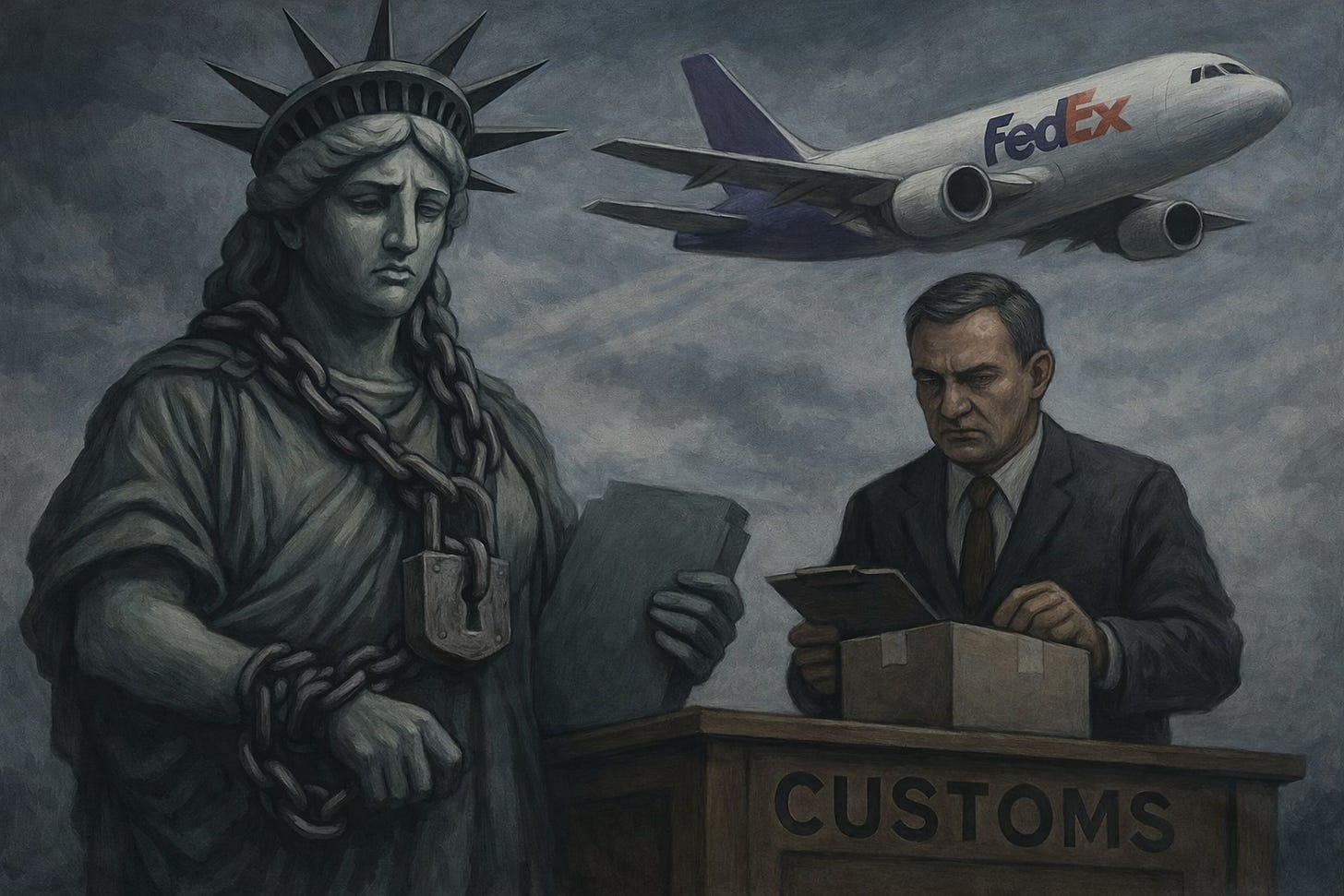The $800 De Minimis Exemption Is Dead
China flows checked, UK exporters hit with £30 per parcel fees, frictionless trade ends.
If you read the previous post The End of $800 on why the de minimis rule died, the politics, the winners and losers, this is the continuation. Same story, different angle: what operators should do now.
Minimal theory, maximum execution.
It happened.
The $800 de minimis rule, a quiet engine of global commerce over the last decade, is gone. Ended by executive order signed July 30, 2025, effective August 29, 2025. It’s an abrupt stop to a system first created in the 1930s. Now, every single low-value parcel entering the U.S. is subject to a full customs process.
For years, the rule allowed packages valued under $800 to enter America duty-free with minimal paperwork. It was designed for administrative convenience in the 1930s, avoid the hassle of taxing small shipments. That simple purpose turned into a global trade superhighway after the threshold was raised in 2016.
By 2024, these shipments reached 1.36 billion. Roughly 70% originated from China (with Hong Kong adding more on top).
The rationale is a mix of economics and national security. Officials argued it created an uneven playing field for domestic retailers, who had to comply with sales taxes and consumer laws that foreign sellers could bypass. They also said it was used to evade tariffs on Chinese goods and smuggle illicit items like fentanyl.
The National Council of Textile Organizations called the exemption a backdoor pipeline for cheap, often illegal imports. White House trade adviser Peter Navarro was even more direct, saying that ending the de minimis loophole would save thousands of American lives by restricting the flow of narcotics.
The impact has been a shock to the system. The British Chambers of Commerce likened it to a Brexit-style shock, and they weren’t being dramatic.
Royal Mail briefly suspended parcels to the U.S. while scrambling to create a new process. It has since launched a service that handles duties and fees for customers, adding a 50p handling charge. They weren’t alone: postal operators in multiple countries, including Australia, Japan, India, Mexico and others, temporarily halted some shipments because they lacked the infrastructure to comply.
The clear winners? Private carriers like FedEx and UPS. Their models already rely on extensive customs-clearance and duty-payment systems. They were built for this. National postal services were not.
For UK businesses, the change is brutal. The estimated value of goods shipped to the U.S. under the old regime was about £5 billion in 2021. Now, many companies face a customs declaration and brokerage cost per parcel, often cited around £30, on top of duties and taxes, depending on carrier and setup.
A $100 order could now carry an extra $30–$50 all-in. It varies by HTS code, origin, and carrier fees, but the point stands: it’s a fundamental shift from Delivered Duty Unpaid (DDU) to Delivered Duty Paid (DDP). DDU, where customers pay fees on delivery, is now extremely risky due to sticker shock and refusals.
The knock-on effects are only beginning. The UK’s low-value import rules around the £135 threshold are under pressure, with domestic retailers calling for changes similar to the U.S. move. They argue current rules give foreign platforms, particularly from China, an unfair advantage.
This isn’t just an American thing. It’s a global retreat from low-friction trade. The EU scrapped its VAT de minimis in 2021 and is debating further parcel-handling reforms, including flat-fee approaches.
The era of easy, frictionless international e-commerce is over. For many small businesses, it’s a body blow. For others, it’s a tax on their resilience.
Fast FAQ
Are postal routes dead? No—they're retooling. Some suspended, some resumed with new products (expect instability in the short term).
Is DDU ever acceptable now? Only if you enjoy angry emails. For low-AOV baskets, DDP or prepaid duty is the only way to avoid refusal-on-delivery.
Small sellers: still viable? Yes, but only if you consolidate (multi-order), get landed-cost/HTS right, or migrate to a platform and carrier with DDP baked in.


